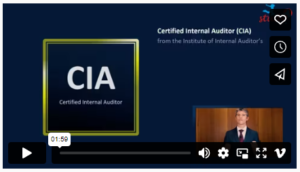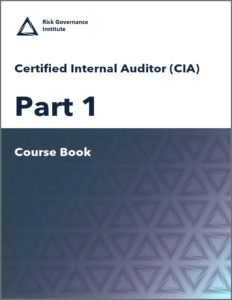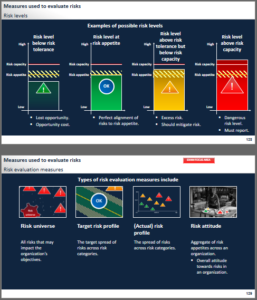The Certified Internal Auditor (CIA) is the most recognized certification for internal auditors and the Part 1 is the first step for internal auditors who wish to go far in their careers.
The course covers all areas in which you need to be proficient through 82 lectures. It is based on the current syllabus of the CIA.
This course has helped many people improve their chances at the CIA, from global Chief Audit Executives to interested students: this course is suited for anyone with an interest in internal audit.
It will help you understand the role that internal audit functions play in an organization and the principles and standards of the profession. It will help you know how to apply key concepts such as independence and objectivity. You will learn how to keep in good standing by knowing how to follow the code of ethics and how to show due professional care and proficiency.
If you manage an internal audit team or want to be ready for when you do, it will help you know whether your reporting lines are appropriate and how to improve your department through quality assurance. You will learn about the essential areas of governance, risk management and internal controls where auditors put much of their work effort. Finally, you will better know how to react if you suspect fraud within your organization.
Most importantly, it aims to help you ‘think’ like an internal auditor, which I find is essential for scoring highly on the exam as well as being a great internal auditor.
Course access is valid for 1 year.
Look for free sample lessons in the Course Content below.
The syllabus of the course covers areas in which students should be proficient for the CIA exam.
It intentionally does not follow the order of the syllabus from the CIA and is organized to present the information in a more progressive and understandable manner.
CIA Part 1 Introduction and Exam Strategy
Introduction to the CIA certification, overview of the content of CIA Part 1 and exam strategies.
I. Fundamental concepts of Internal Auditing
Understand the purpose of an internal audit function, what internal audit does and the principles, framework and standards of the profession.
- Purpose and Definition of Internal Audit
- What Internal Audit Does
- Core Principles
- International Professional Practices Framework (IPPF)
- The Standards
II. Independence, Objectivity and Ethics
Proficiently understand the critical notion of independence and be able to identify if an audit function has organizational independence. Know how to always act ethically as an internal auditor.
- Organizational Independence
- Internal Audit Charter
- Code of Ethics
III. Due Professional Care and Proficiency
Know which areas internal auditors need to be proficient (and which they don’t). Learn how to show or identify due professional care. Recognize how this affects the staffing of internal audit functions.
- Proficiency and Due Professional Care
- Internal Audit Staffing
IV. Quality Assurance and Improvement Program
Know how to conduct an internal audit quality internal assessment and how external assessments must be performed.
- Quality Assurance and Improvement Program
V. Governance, Risk Management and Internal Control
Gain an understanding of internal audit’s role in governance, risk management and internal controls. Learn about different frameworks for assessing these areas.
- Internal Control
- Control Self-Assessment
- Internal Control
- Frameworks
- Risk Management
- Internal Audit’s Role in Risk Management
- Roles in the COSO ERM Model and ISO 31000
- Reliance on Internal Assurance
VI. Fraud Risks and Culture
Learn how to identify fraud risks and what to do if fraud is suspected. See how internal audit can change an organization’s culture.
- Fraud Risks
- Fraud Investigation
- Culture and Ethics
There are no prerequisites for participating in the course.
If you wish to pass the exam, it is nonetheless recommended that you supplement the course with the following material:
- A written study guide.
- Sufficient practice questions.
- The Code of Ethics from the IIA.
- The Standards from the IIA.
The recommended credits for Continuing Professional Education (CPE) for the course is 7 CPE.
A certificate will be delivered after completion of the full course. The recommended number of CPE is stated on the certificate.
The course is intended to meet all the criteria established by the Institute of Internal Auditors (IIA).
Adrian Resag, QIAL, CMIIA, CIA, CISA, CRMA, CFSA, CCSA, CIMA Adv Dip MA
I have a great passion in the areas of internal audit, governance, risk management, IT & information systems auditing, internal control and fraud prevention. I would like to share those great interests of mine with those who wish to learn.
I am currently Head of Internal Audit, Risk Management and Internal Control to a well-known luxury brand, and previously was Head of Internal Audit in a global financial services institution and Chief Internal Auditor to the European subsidiary of a major global bank. I worked as Group Internal Auditor in the energy sector and advisor in internal audit in a ‘Big-4’ consulting firm.
I have been teaching students and professionals in university, institutions and organizations since 2005.
I hold the following qualifications and certifications:
- Qualification in Internal Audit Leadership (QIAL) from the Institute of Internal Auditors (IIA);
- Chartered Internal Auditor (CMIIA) from the Chartered Institute of Internal Auditors;
- Certified Internal Auditor (CIA) from the Institute of Internal Auditors (IIA);
- Certified Information Systems Auditor (CISA) from ISACA;
- Certification in Risk Management Assurance (CRMA) from the Institute of Internal Auditors (IIA);
- Certified Financial Services Auditor (CFSA) from the Institute of Internal Auditors (IIA);
- Certification in Control Self-Assessment (CCSA) from the Institute of Internal Auditors (IIA);
- Technical Specialist of the Institute of Risk Management (SIRM);
- The Advanced Diploma in Management Accounting (Adv Dip MA) from the Chartered Institute of Management Accountants (CIMA);
- ISO 22301 (Business Continuity Management Systems) Lead Auditor training and experience; and
- ISO 27001 (Information Security Management Systems) Lead auditor experience.




